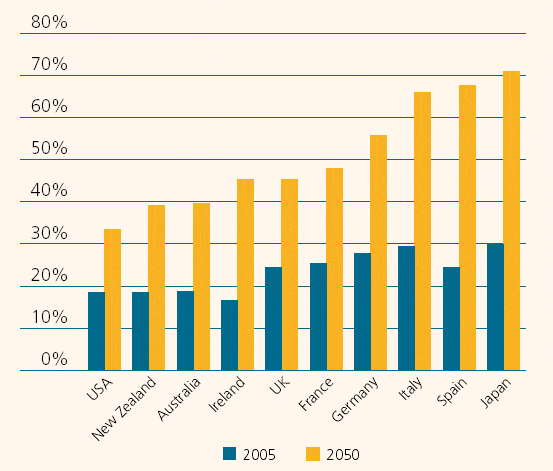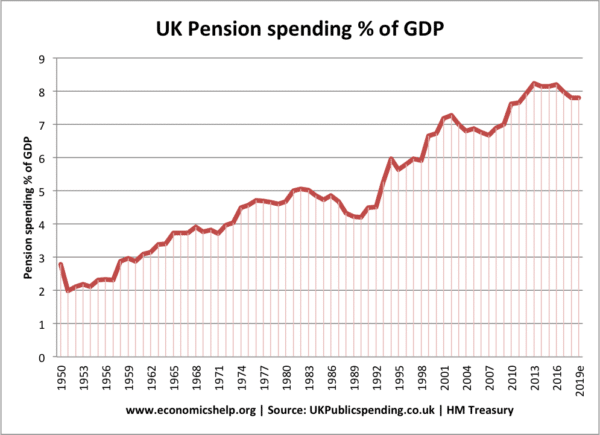Many Western economies face a demographic time bomb – an ageing population, which places strain on government spending and the welfare state. To deal with this situation, governments face several difficult choices –
- Raise taxes to pay for pensions,
- Shift the emphasis on to the private sector provision of pensions,
- Raise the retirement age
- Cut other forms of spending to be able to maintain pension commitments.
Recently, the UK chancellor George Osborne, has suggested that he favours a solution which involves automatically linking state pension to life expectancy; this could see the state retirement age, increasing to 70. It is estimated, this could save up to £500bn over 50 years; there would be a very significant opportunity cost to keeping the retirement age at 65.
However, others are more critical of increasing the retirement age. They argue that raising the retirement age will adversely affect low income workers who find it more difficult to save for a private pension. Also, some economists question whether we really have a demographic time bomb, and argue that the fears of an ageing population are exaggerated.
The extent of the problem
The dependency ratio is the ratio of people who are not of working age compared to those who are of working age. If there is a higher % of pensioners then the dependency ratio will rise. Basically a higher dependency ratio means a relatively greater number of benefit recipients to tax payers.

Source: Dept for work and Pensions
This graph shows that all Western economies face a rise in the dependency ratio (assuming a retirement age of 65). However, the UK’s demographic forecast is not as bad as other countries. This is partly because the UK has had significant levels of immigration and an increase in the population.
How UK spending on pensions has increased

Arguments for raising the pension age to 70
1. Increasing life expectancy . Increasing life expectancy means that it makes sense to raise the retirement age. When the first state pensions were introduced in 1908, the pension age was set at 70. It was later reduced to 65. But, since the start of the Twentieth Century, we have seen a rapid increase in life expectancy. It means that people are living for longer. If we keep the retirement age the same, we are trying to support an ever increasing % of people’s life in retirement. Rather than seeing it as a bad thing the retirement age is increasing, we should see it as a good thing we are enjoying greater life expectancy. Since 1981, longevity has increased 5.3 years
2. Higher tax revenue. As well as saving the government pension spending, if people work longer it will increase income tax revenues. Increasing the labour supply will also increase the productive capacity of the economy.
3. Will enable the government to increase the value of the state pension. If the retirement age is increased, the government will be able to afford an increase in the real value of the state pension. A higher basic state pension will help reduce poverty without creating disincentives to save that means tested top up benefits do. People may prefer a decent pension spread over a smaller number of years than a limited pension stretched over a longer time period.
3. More flexible labour markets. At the moment, several professions have a fixed retirement age; this means people have to retire at a certain age, even if they would prefer to keep working. Increasing the state pension age, will enable people to work longer. It may be that people work part time towards the end of their working life, but it will help increase the supply of labour. With jobs increasingly non-manual, there isn’t any physical barrier for people to keep working. It means the economy can benefit from highly experienced and highly skilled workers.
4. Better than the alternatives. The alternatives to increasing the retirement age are also unattractive. It would entail placing a higher tax burden on the working population; these higher tax rates could reduce incentives to work.
Arguments against raising the pension age
1. Difficulty in finding work in late 60s. Often there is a degree of age discrimination with some employers more reluctant to employ people in their 60s, people may find it harder to gain employment in their late 60s. However, the hope will be that raising the retirement age will change attitudes to employing people of a higher age.
2. Difficulties for those with more manual jobs. Although there are less ‘heavy manual’ jobs in the economy, there are still significant numbers of manual labour. These workers will find it relatively harder to keep working until they are 70.
3. Inequality for low-income workers. Raising the retirement age will affect low income workers the most. This is because they have the greatest difficulty in saving for a private pension. High income workers will be able to build up a private pension, which will enable them to take early retirement before the state pension takes effect. However, on the other hand, you could argue raising the retirement age will encourage people to save for private pensions, which is something the government wishes to do.
When will you retire?
- Pension age to increase to 66 (finishing by 2020)
- State Pension age to increase to 67 (to begin in 2026 and finish in 2028)
- A forthcoming pension review could see retirement age automatically linked to life expectancy. This could see the retirement age increase to 70 by 2060.
Related
External
- State pension age at gov.uk

I think the state pension as we know it will itself be retired because no government is going to raise taxes to the level required to sustain it.
Rather the burden will be shifted to indivduals and business via a scheme of which the Workplace Pensions Scheme is either example or prototype.
The problems of course will remain!
a difficult issue and one that opposition politicians of either party would have a free kick with, but any sensible Australian will appreciate the problems associated with an aging society.
The pension age must either go up or else all workers will have to be taxed to cover pensions or contribute more to super to cover themselves as they reach retirement age. Perhaps both may apply.
I dont agree with raising the state pension age,im currently 45 and there is no way i will be able to do my job at 67.as very maual.
They should not rasie it high it will cause so many problems
People who can’t do manual jobs when they are older can change and do less manual jobs when they are older, leaving younger people to the laborious work.
There is no economic analysis in this article. This is a financial analysis.